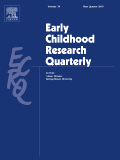From the abstract: "Evidence suggests that household chaos is associated with less optimal child outcomes. Yet, there is an increasing indication that children’s experiences in childcare may buffer them against the detrimental effects of such environments... Using data from The Family Life Project (n = 1235)—a population-based sample of families from low-income, rural contexts—our findings indicated that household disorganization in early childhood was predictive of worse cognitive and social outcomes at approximately age 5. However, these relations were substantially attenuated for children attending greater childcare hours..." highlights and full article
news stories about the Family Life Project
Unstable Child Care Can Affect Children by Age 4;
Researchers Rely on Rural Families for Key Insights on Children;
Mounting Challenges Undermine Parenting;
Study Reveals How Rural North Carolinians Survived the Recession
